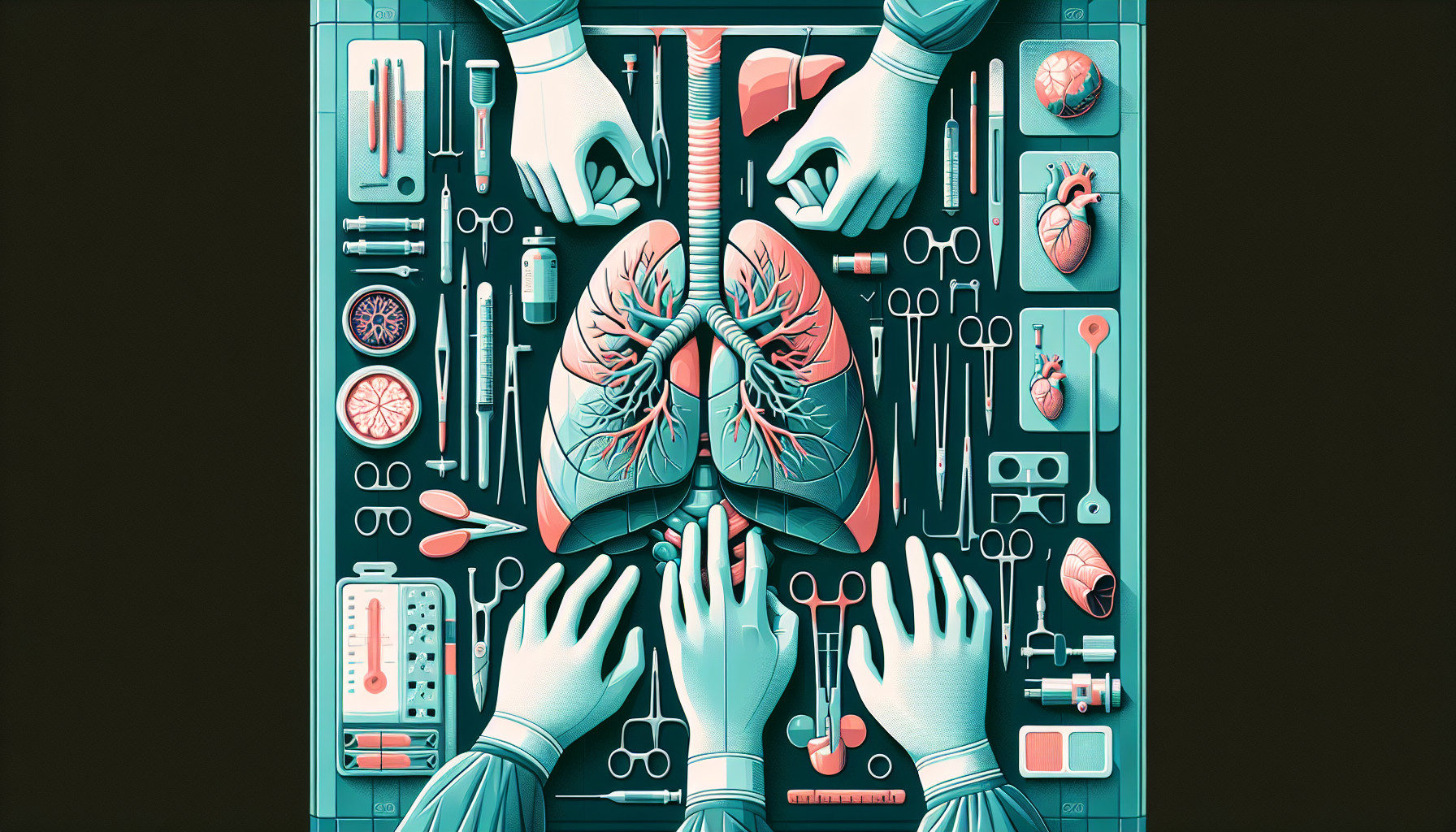Our Summary
This research paper is about a study conducted to understand the effectiveness of a type of cancer treatment called immunotherapy, specifically for a type of lung cancer called non-small cell lung cancer. This treatment was used before surgery to remove lung cancer, a process known as neoadjuvant therapy.
The researchers looked back at medical records from patients with this type of lung cancer who were treated at two major medical centers, one in North America and one in Europe, between 2017 and 2019. There were 37 patients in total, almost half of whom had advanced stages of the disease. About half of these patients received only immunotherapy, while the others received it in combination with other treatments like chemotherapy and radiation.
The researchers found that after receiving immunotherapy, these patients underwent various types of lung surgeries. 16% of these surgeries were minimally invasive. After surgery, about a quarter of patients experienced complications, but there were no deaths within 90 days of surgery. Also, about 73% of patients with early-stage disease and 55% of those with advanced disease did not see their cancer return within one year after surgery.
In conclusion, the researchers found that giving immunotherapy before surgery is safe and likely to become a standard treatment option. It may also make surgery a viable option for certain patients with advanced lung cancer.
FAQs
- What type of cancer treatment was the focus of this research study?
- What were the main findings of this research study on the use of immunotherapy as a neoadjuvant therapy?
- What are the potential benefits of using immunotherapy before surgery in treating non-small cell lung cancer?
Doctor’s Tip
A doctor might tell a patient undergoing lung resection that receiving immunotherapy before surgery can be a safe and effective treatment option. This neoadjuvant therapy may help reduce the risk of cancer recurrence and make surgery a viable option for patients with advanced lung cancer. It is important to discuss all treatment options with your healthcare team to determine the best plan for your individual situation.
Suitable For
Patients who are typically recommended for lung resection include those with early-stage non-small cell lung cancer, particularly those with operable tumors. Additionally, patients who have responded well to neoadjuvant therapy, such as immunotherapy, and have a good overall health status may also be considered for lung resection. Patients with advanced-stage disease may also be recommended for lung resection if their tumors are operable and they have responded well to neoadjuvant therapy.
Overall, the decision to recommend lung resection for patients with lung cancer is based on various factors, including the stage of the disease, the response to neoadjuvant therapy, the overall health status of the patient, and the operability of the tumor. It is important for patients to discuss their treatment options with their healthcare providers to determine the most appropriate course of action for their individual case.
Timeline
Timeline before and after lung resection:
- Patient is diagnosed with non-small cell lung cancer
- Patient undergoes neoadjuvant therapy, including immunotherapy
- Patient undergoes lung surgery, either minimally invasive or traditional
- Patient experiences complications in about a quarter of cases
- Patient recovers from surgery with no deaths within 90 days
- Patient is monitored for cancer recurrence
- 73% of patients with early-stage disease and 55% of those with advanced disease do not see cancer return within one year after surgery
- Researchers conclude that immunotherapy before surgery is safe and effective, potentially becoming a standard treatment option
What to Ask Your Doctor
Some questions a patient should ask their doctor about lung resection include:
- What is the purpose of lung resection in my specific case?
- What are the potential risks and complications associated with lung resection?
- What is the recovery process like after lung resection surgery?
- Will I need any additional treatments, such as chemotherapy or radiation, after lung resection?
- How likely is it that the cancer will return after lung resection?
- Are there any alternative treatment options to consider before undergoing lung resection?
- How experienced is the surgical team in performing lung resection procedures?
- Will I need any additional tests or evaluations before undergoing lung resection surgery?
- What is the success rate of lung resection for patients with my type and stage of lung cancer?
- Are there any lifestyle changes or precautions I should take after undergoing lung resection surgery?
Reference
Authors: Beattie R, Furrer K, Dolan DP, Curioni-Fontecedro A, Lee DN, Frauenfelder T, Hoeller S, Weder W, Bueno R, Opitz I, Swanson S. Journal: Eur J Cardiothorac Surg. 2021 Dec 1;60(6):1297-1305. doi: 10.1093/ejcts/ezab340. PMID: 34331065
